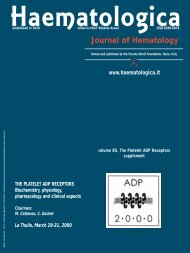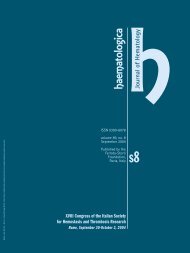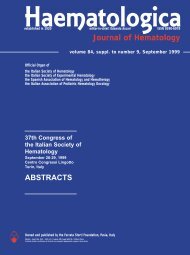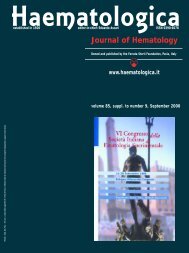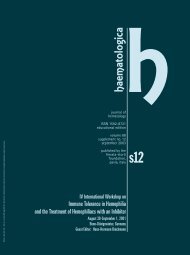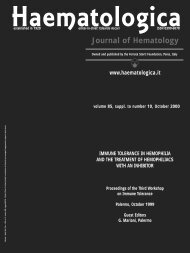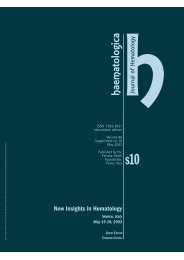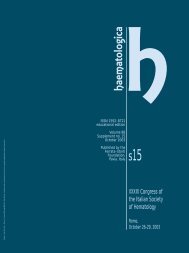Haematologica 2003 - Supplements
Haematologica 2003 - Supplements
Haematologica 2003 - Supplements
You also want an ePaper? Increase the reach of your titles
YUMPU automatically turns print PDFs into web optimized ePapers that Google loves.
368<br />
PHARMACOGENOMIC STUDIES OF BORTEZOMIB<br />
(VELCADETM) TREATMENT IN LATE STAGE<br />
MULTIPLE MYELOMA<br />
G.Mulligan, B. Bryant, J.Stec, S. Kim, M.Morrissey,<br />
A.Damokosh, A.Singh, A.Bolt, A.Schmitt, J.Metivier,<br />
J.Larsen-Gallup, D.Esseltine, J.Adams, D.Schenkein, A.<br />
Boral, J. Brown, G. Linette, J. Ross, and the SUMMIT<br />
Myeloma Study Group*<br />
Millennium Pharmaceuticals, Inc. Cambridge, MA<br />
The clinical development of the proteasome inhibitor, bortezomib<br />
(VELCADETM) for the treatment of late stage multiple myeloma<br />
has included a transcriptional profiling-based pharmacogenomics<br />
strategy to identify genomic predictors of response and further<br />
elucidate the mechanism of action of the drug. Through a<br />
collaborative effort with the Phase II SUMMIT clinical trial sites,<br />
patient bone marrow aspirates were subjected to a rapid negative<br />
selection enrichment protocol to purify myeloma cells before being<br />
frozen and shipped for centralized pharmacogenomics assessment.<br />
Sixty-two percent of 202 patients agreed to the optional expression<br />
profiling analysis. The intrinsic gene expression patterns of these<br />
samples were determined on Affymetrix U-133 oligonucleotide<br />
microarrays prior to treatment with bortezomib. Multiple<br />
bioinformatic marker selection algorithms with supervised learning<br />
were used to identify genes expression patterns that characterized<br />
the differences between responders and non-responders to<br />
bortezomib using the Blade response criteria. Predictive accuracy<br />
as determined by 5 fold cross validation was significant (71-78%,<br />
range) in multiple models. These pharmacogenomic studies of late<br />
stage multiple myeloma patients is continuing with the evaluation<br />
of new samples obtained from patients in the Phase III clinical trial<br />
designed to further discover new markers and validate the current<br />
predictive gene sets.<br />
369<br />
Effects of PS-341 and PS-1145 on cytokine-mediated<br />
proliferation and anti-apoptosis in myeloma cells.<br />
Unn-Merete Fagerli, Vadim Baykov, Torstein Baade Ro,<br />
Anders Waage, Anders Sundan and Magne Borset.<br />
Norwegian University of Science and Technology, Dept. of Cancer<br />
Research and Molecular Medicine; Dept. of Oncology and Section<br />
of Haematology, Trondheim University Hospital, Trondheim,<br />
Norway.<br />
Several cytokines have been implicated in the pathogenesis of<br />
multiple myeloma (MM). Interleukin (IL)-6 is an important<br />
growth and anti-apoptotic factor for MM cells. However, other<br />
cytokines may substitute for IL-6, for example tumor necrosis<br />
factor (TNF), IL-10, IL-15, insulin-like growth factor (IGF)-1 or<br />
IL-21. For instance, in the human myeloma cell line OH-2,<br />
combinations of TNF with IL-10, IL-15 or IL-21 give synergistic<br />
effects on proliferation and a stronger response than IL-6 alone.<br />
We examined in vitro effects of the proteasome inhibitor PS-341<br />
and the IkB kinase inhibitor PS-1145 on the cytokine-dependent<br />
myeloma cell lines OH-2 and IH-1 as well as on the cytokineindependent<br />
cell line RPMI 8226. We wanted to see if the two<br />
substances discriminated between MM cells stimulated to grow by<br />
different cytokines and combinations of different cytokines. We<br />
examined proliferation by 3H-thymidine incorporation and<br />
induction of apoptosis by Annexin V-FITC/propidium iodide flow<br />
cytometry.<br />
PS-341 inhibited proliferation and induced apoptosis in all cell<br />
lines, irrespective of which cytokine stimulated the growth. In the<br />
proliferation assay ED50 was 1.3 nM.<br />
PS-1145 inhibited TNF-induced proliferation of OH-2 cells by<br />
more than 50% in a dose-dependent manner, whereas growth<br />
stimulated by other cytokines was inhibited less than 25%. In the<br />
apoptosis assay, PS-1145 totally inhibited the anti-apoptotic<br />
effect of TNF in OH-2 cells, whereas little or no inhibition was<br />
seen against anti-apoptosis mediated by IL-6 or IL-21. When<br />
growth of OH-2 cells was supported by a combination of TNF<br />
and other cytokines, proliferation or anti-apoptosis was inhibited<br />
to the level seen in controls without TNF. Because of the striking<br />
synergy between TNF and other cytokines in OH-2 cells, the<br />
effect of PS-1145 was most pronounced under these conditions,<br />
both in absolute and in relative sense (e.g. more than 60%<br />
reduction of proliferation stimulated by TNF and IL-21).<br />
Conversely, in the IH-1 cell line, which is not growth-stimulated<br />
by TNF, PS-1145 gave a less than 10% reduction in proliferation<br />
of cells stimulated with a combination of TNF and IL-6.<br />
In the cytokine-independent cell line RPMI-8226, PS-1145 was<br />
pro-apoptotic only in the presence of TNF, showing that TNF<br />
became cytotoxic when added together with PS-1145.<br />
In conclusion, PS-341 induces apoptosis irrespective of which<br />
cytokine is promoting growth of the cells, suggesting that its proapoptotic<br />
effect is not linked to any specific signaling pathway. In<br />
contrast, PS-1145 seems to be specific for TNF-mediated growth,<br />
and in fact, TNF itself becomes cytotoxic in the presence of PS-<br />
1145. The anti-proliferative effect of PS-1145 is most<br />
conspicuous when TNF is combined with other growthpromoting<br />
cytokines. We have earlier suggested that TNF might<br />
be more important to myeloma growth as a synergistic stimulant<br />
than its effect as a single agent suggests. Inhibition of TNFinduced<br />
and NF-kB-mediated proliferation and anti-apoptosis is<br />
promising, suggesting a place for PS-1145 or other agents<br />
targeting NF-kB in treatment of MM.<br />
370<br />
Proteasome inhibitors induce growth inhibition and<br />
apoptosis in human myeloma cells irrespective of<br />
chromosome 13 deletion<br />
Ivana Zavrski, Christian Jakob, Ulrike Heider, Claudia<br />
Fleissner, Jan Eucker, Kurt Possinger, Orhan Sezer<br />
Department of Hematology and Oncology, Universitätsklinikum<br />
Charité, Berlin, Germany.<br />
The proteasome is a ATP ubiquitin-dependent protease which<br />
plays a crucial role in degrading cytosolic and nuclear proteins,<br />
which are strongly involved in basic cellular functions, like the<br />
cell cycle regulation, transcription of growth factors and<br />
apoptosis. The inhibition of the ubiquitin-proteasome pathway<br />
leads to an uncoordinated expression and degradation of several<br />
short living proteins required for appropriate cell cycle<br />
progression and survival in malignant cells and activates<br />
apoptosis. In this study, we investigated the effects of cellpermeable<br />
proteasome inhibitors MG-132, MG-262, PSI and<br />
lactacystin on multiple myeloma cell lines OPM-2, U266,<br />
RPMI8226 and freshly isolated plasma cells with or without<br />
deletion of chromosome 13 from patients with multiple myeloma<br />
or plasma cell leukemia, and CD34+ human hematopoietic stem<br />
cells. The effects of proteasome inhibitors on cell cycle<br />
progression, cell growth and apoptosis were determined.<br />
Using the MTT-assay, we found PSI with the half maximal<br />
cytotoxicity (IC50) of 5.7 nM to be the most potent proteasome<br />
inhibitor among those tested, followed by MG-262 (31 nM), MG-<br />
132 (177 nM) and lactacystin (>1 µm). The growth inhibition<br />
occurred despite of deletion of chromosome 13, there was no<br />
significant difference for IC50 between myeloma cells with and<br />
S253



